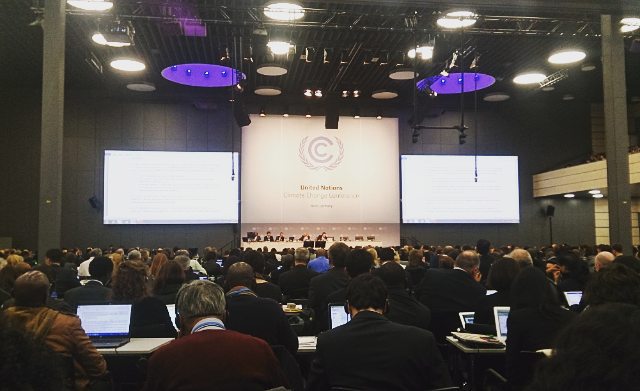BONN, Germany–Climate justice activists came together on the last day of the Bonn session today to demand countries to pledge their fair share of climate action, and agree on a fair deal in Paris, in a fair process which fully involves civil society.
Lidy Nacpil, Coordinator of the Asian Peoples’ Movement on Debt and Development, referred to the Fair Shares civil society review of national climate pledges, which shows that the ambition of wealthy developed countries falls well short of their fair share, while developing countries have made pledges that exceed or broadly meet their fair shares.
“All countries need to do their fair share, but the study clearly shows that the onus is on developed countries to drastically cut their emissions and provide finance to developing countries,” Nacpil said.
Chee Yoke Ling, Director of Third World Network, said that without a fair deal in Paris there will be temperature increase of more than 2 degrees Celsius and a perpetuation of injustice against developing countries and their peoples.
“The week started with a very unbalanced text prepared by the Co-Chairs that favored the United States and its allies. United efforts by developing countries continue to meet with resistance as major developed countries persist in chipping away at their commitments and the equity basis of the Convention,” she said.
Gita Parihar, Head of Legal at Friends of the Earth England, Wales & Northern Ireland, said that civil society observers will meet with the French president of COP 21 to deliver a statement from more than 170 organizations to demand for their full participation in the climate talks.
“Observers may still be out of the room but we have not gone away. All countries should join with the developing world to ensure our rightful participation in Paris – and the EU must comply with its legal obligations to do so,” she said.
Brandon Wu, ActionAid’s Climate Finance Expert, said rich countries know they’ve failed to meet an obligation but refuse to admit it or make a good-faith attempt to fix the problem.
“Trust will be the key to a successful agreement in Paris and yet we’ve seen rich countries undermine that trust by coming up with new, creative ways to pretend they’re delivering climate finance – when in fact they’re falling hugely short. Using loans, double-counting development aid as climate finance, making demands that certain developing countries chip in – these are not trust-building actions,” he said.
Noelene Nabulivou, of Pacific Partnerships on Gender, Climate Change and Sustainable Development; DIVA for Equality; and Development Alternatives with Women for a New Era (Fiji), said that women and people of small island states are here as full human rights bearers, demanding right to life, to development, to exist as cultures, societies and individuals.
“We are not here at the negotiations to trade away our human rights with those who have too much, have done too much to increase climate injustice, and will not change their ways. Gender equality and women’s human rights must be clear in the text, in all sections. And this agreement must also reflect strongest ambition, and full recognition of loss and damage, to contribute to addressing deeper systemic issues of unfairness and inequality.”
—-
info and photos from Denise Fontanilla
Latest posts by EnviroNewsph (see all)
- Global fund aimed at protecting nature and accelerate investment in conservation, launched in Canada - August 25, 2023
- Why ‘loss and damage’ is the most bitterly fought-over issue at COP27 climate talks? - November 18, 2022
- U.S. hands over P2.3M in equipment and wildALERT system to PH to protect wildlife - December 16, 2020

